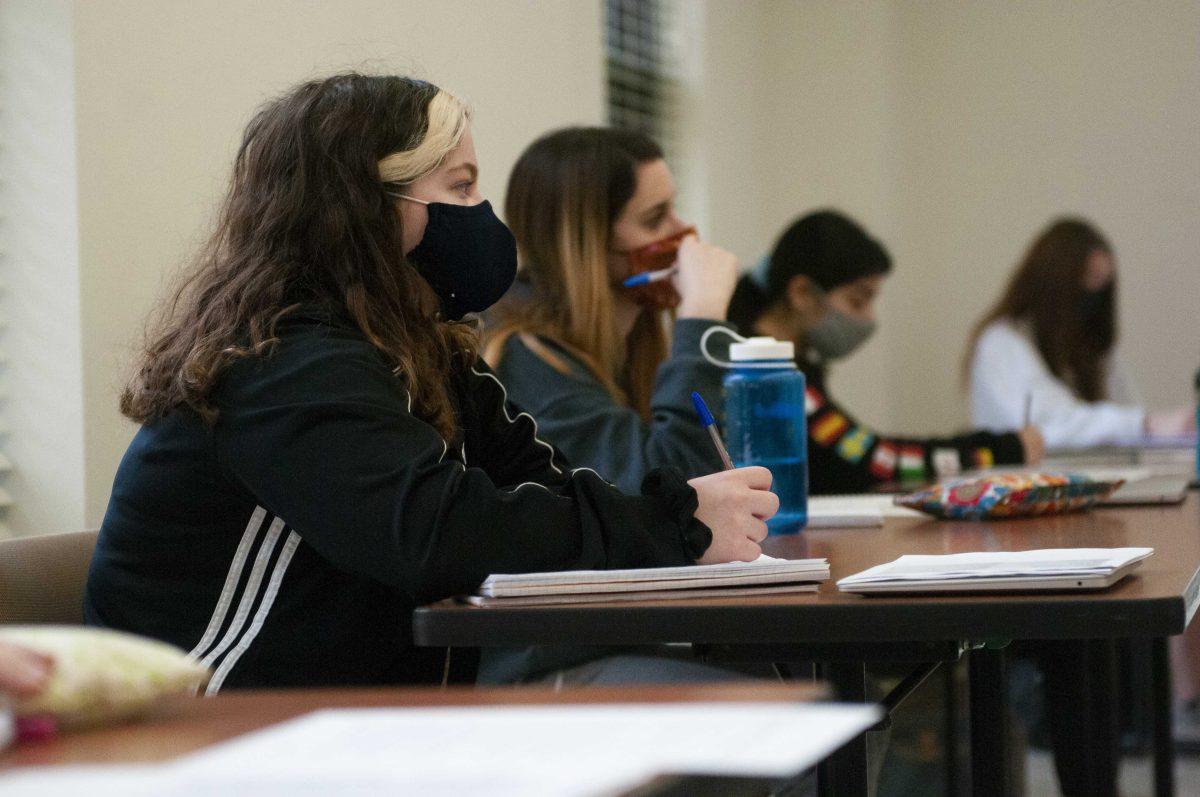LSU announced in a March email that it plans to operate similarly in Fall 2021 as it did pre-pandemic, assuming vaccinations continue to be administered as planned.
“We expect the vast majority of courses to be delivered face-to-face once again, and for the majority of campus operations to be back to normal,” the email read. “We expect that overall, Fall 2021 will operate similarly to Fall 2019.”
But after a year of remote learning, hybrid classes and strict health precautions across U.S. campuses, questions remain about what changes are here to stay at universities: what the new normal may look like at LSU and in higher education more generally for the foreseeable future.
The abrupt switch to online learning in 2020 has forced students, professors and administrators to rethink certain aspects of college life, like the role of online classes in the traditional university experience, virtual office hours and virtual access to live events – some changes that may be here to stay.
Nearly one-third of college students “never want to take another class via Zoom,” according to a College Pulse and Inside Higher Ed survey. Half of the respondents said that while some things about remote learning worked for them, they are “anxious to get back to all or more in-person classes.”
Mass communication freshman Ashlyn Anderson will take her first in-person class in the fall as a sophomore. She said she isn’t planning on taking hybrid classes in the future, but that remote learning has taught her independence and self-discipline.
“I’ve had so many asynchronous classes and I’ve had to keep up with due dates and studying on my own,” Anderson said. “I’m taking that into account next semester when dealing with studying and doing classes in the future.”
Mass communication junior Austin Wade said online classes made it hard for him to understand the material presented in class, and he said it made him feel like a “horrible’’ student.
“I’m excited to be able to ask those questions in person, have a classmate I can whisper to and walk up after class to ask questions about things I’m a bit confused about,” Wade said.
Despite many students’ desire to return to campus, some aspects of the online experience are likely here to stay, like Zoom office hours.
Mass communication professor Will Mari said the switch to remote learning taught him that he could teach his classes more efficiently.
“Sometimes less is more,” Mari said. “I’ve learned that students don’t need to meet with me every class period. Sometimes it’s okay to have a Friday or Monday class period that has part of it outside of class.”
Having taught part-online classes before, the switch to Zoom wasn’t difficult for Mari.
“I’ll use it again,” he said. “I probably won’t use as much of it because I think we’re all a little Zoomed-out, but I’ll use it again, especially for students who need to meet me for office hours.”
LSU higher education professor Ashley Clayton said she was resistant to the online platform.
“I am very pro in-person delivery,” Clayton said. “I believe that having that in-classroom discussion is so valuable. I just feel like the online platform is impersonal.”
Despite her resistance to online learning, she said the pandemic has forced her and others who study higher education to reconsider how much of the college experience can be replicated online.
“Prior to the pandemic, we had less confidence that we could replicate on-campus learning to the online platform, myself included, but I do think after the pandemic, we’ve learned better practices of how to manage the online classroom,” Clayton said. “I do think some meetings and some office hours and interactions with students will remain on Zoom.”
The same College Pulse and Inside Higher Ed survey found that there are multiple COVID-era experiences students would like to persist even as the pandemic ends:
-
Nearly 80% of students said they’d like to see lectures made available online so they can go back and review material.
-
Almost half said they’d like the option to attend courses in-person or online.
-
Roughly 35% percent said they still want virtual access to live events and online access to college support resources.
The pandemic’s disruption of social life affected students most acutely, according to the survey, which found that 73% of students missed “friends and social life” the most.
“Students have been isolated in the past year–they haven’t been able to make friends and go to events,” Clayton said. “That is, in some ways, more concerning than the online learning for me.”
Academic integration and social integration of students are two main factors that contribute to student success and retention, Clayton said.
“There’s tons of research showing that you need both to persist through college,” she said. “If you’re only academically integrated and engaged but you’re not socially integrated, and you don’t have those social outlets and networks, then you’re less likely to persist.”
Wade and Anderson said they’re looking forward to being on campus again and experiencing LSU in a post-COVID world.
“I miss seeing all the students in the quad, making friends in classes and the rush of trying to make it from one place to another,” Wade said. “It’s been really hard to relax and find friends since the pandemic started.”





